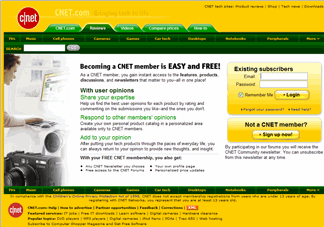The traditional message board was cool because you felt like you were able to jump from room to room at a party throwing in your $0.02 and jumping back out without consequence. You saw your post on the site with your fake name next to it, and it was exhilarating the first few times, addictive to many. The blogging model changed this by forcing people to own up to their remarks and lowering conversation barriers...there were suddenly no moderators, and your name was attached to everything you said forever.
At the other end of the spectrum, there are some very very lightweight ways that I can affect change on the Internet without making such a heavy commitment. I can vote for other people's blog posts and news articles on Digg. I can rate a song on Yahoo! Music Engine. I can save an article with descriptive tags in del.icio.us.
The most important element of the user interaction model in these lightweight participation systems is the tangible and immediate feedback loop, one where my contribution has a specific effect on the wider pool. My vote in Digg boosts the importance of an article for the entire community. My song rating in YME gives me highly relevant playlists. My tags in del.icio.us build a data pool I can leverage for myself and share with other people for a range of purposes.
 But there are plenty of ways to fail at getting lightweight participation right, too. For example, I find the CNet style product ratings very annoying. They actually invite me to give them my email address and to register for the site with this enticing marketing copy: "Help us find the best user opinions for each product by rating and commenting on
the submissions you like--and the ones you don't.". Why should I do that? There's no benefit to participating. They get much more out of using my data and my contribution than I do. Forget it.
But there are plenty of ways to fail at getting lightweight participation right, too. For example, I find the CNet style product ratings very annoying. They actually invite me to give them my email address and to register for the site with this enticing marketing copy: "Help us find the best user opinions for each product by rating and commenting on
the submissions you like--and the ones you don't.". Why should I do that? There's no benefit to participating. They get much more out of using my data and my contribution than I do. Forget it.The right model is one where I'm getting more value in return than it costs me to participate. If I'm not personally making a profit of some sort, then there had better be a gain for the community as a whole. Otherwise, my participation is only helping the proud owners of the site that invited it.
Trackbacks:
TrackBack URL:
http://www.mattmcalister.com/blog/_trackback/1716474
